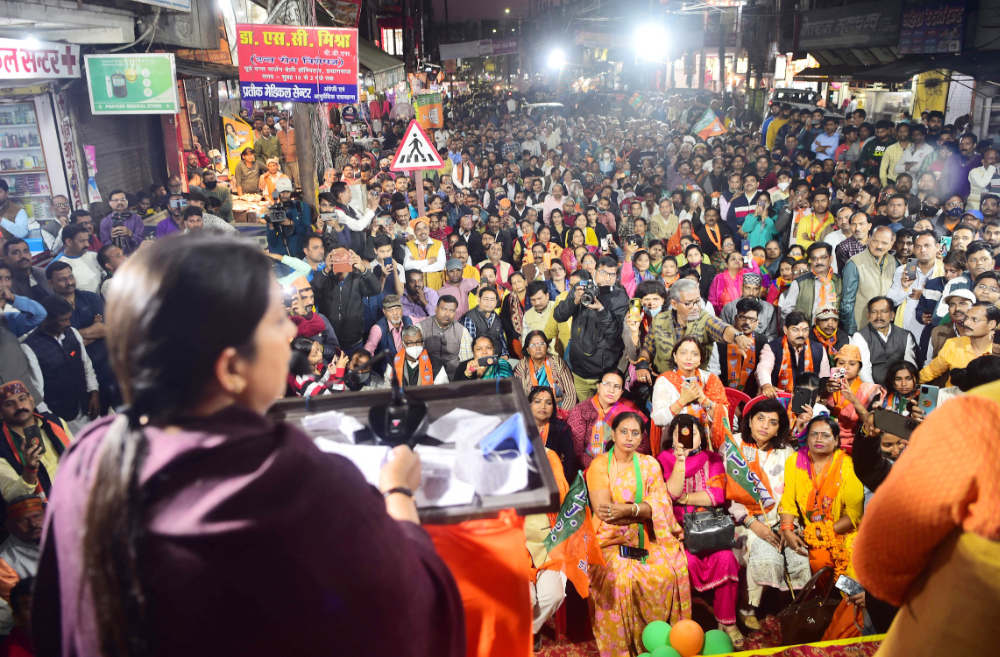NEW DELHI: The buildup of stray cows in India’s most populous state has grown into one of the main issues in the ongoing regional elections as voters head to the polls on Wednesday.
Farmers in Uttar Pradesh, a largely impoverished state of 200 million people in northern India, say the number of stray cows ambling around towns and villages has been increasing and becoming a menace for crops; a disruption farmers and experts say is caused by policies implemented by the state’s governing Bharatiya Janata Party (BJP).
Protecting cows, which are considered sacred to Hindus, was an important measure designed to boost support for the BJP in the heavily populated and Hindi-speaking belt that has been a heartland for the party.
When the party took power in Uttar Pradesh in 2017, officials introduced policies that included a ban on cow slaughter and traditional cattle markets, as well as closures of butcher houses.
The measures led to a huge rise in the cattle population, subsequently impacting local farmers and their sources of income. Cow attacks, which led to heavy injuries and some deaths, have also blighted the state.
“The issue of stray cattle has deprived us of our peace,” 42-year-old Ashok Kumar Yadav, from the state’s Mainpuri district, told Arab News.
Like many other farmers across Uttar Pradesh, where agriculture is a mainstay, Yadav stays awake at night to guard his field or face losing their crops to the cattle.
“We have to be on guard all the time,” he added.
Yadav and his peers used to sell their old cattle in the markets or slaughterhouses for extra income, but he reported that farmers are “badly suffering” due to that economic opportunity being snatched away.
There were about 1.16 million stray cows in Uttar Pradesh according to the 2019 Livestock Census, up more than 17 percent compared to 2017.
Prime Minister Narendra Modi said he would “get rid” of the problem during an election rally in the state on Monday, promising that officials will create a system that would generate income for the population.
Uttar Pradesh is one of five Indian states voting in phases in February and March, in what is seen as a barometer of Modi and BJP’s popularity ahead of general elections in 2024. Election results are expected on March 10.
While religion has been one of the main issues in previous elections across India, this time voters in Uttar Pradesh appear more focused on their ripple effect in the economy.
“Last time I voted for the BJP in the name of religion, but now we realize that politics of religion damages us very badly,” Shiv Veer Singh, a farmer from Etawah district, told Arab News.
“The disruption of the age-old economic cycle in the name of cow protection has damaged us all economically,” Singh said.
The BJP said they were working to address the issue.
“We have taken several steps for the protection of cattle by acquiring lands meant for cattle grazing. We took steps in building lots of cow shelters,” Rakesh Tripathi, the BJP spokesperson in Uttar Pradesh, told Arab News.
The Samajwadi Party, seen as a main challenger to BJP’s incumbency in Uttar Pradesh, has promised over $6,500 to those who have died to cow attacks.
Stray cattle is a “serious issue” for the rural economy that “did not exist until five years ago,” said Delhi-based economist Prof. Santosh Mehrotra from Jawaharlal Nehru University.
Mehrotra added that the disruption of the cattle economy in rural India has also impacted other industries, including meat exports and leather and footwear, with the former valued at about $4 billion in 2015.
“The BJP only did politics in the name of cow shelters but did nothing to save cattle or take care of them,” political analyst Asad Rizvi told Arab News.
“People are angry over the issue of stray cattle and the BJP might have to pay a political price for this,” he said.




